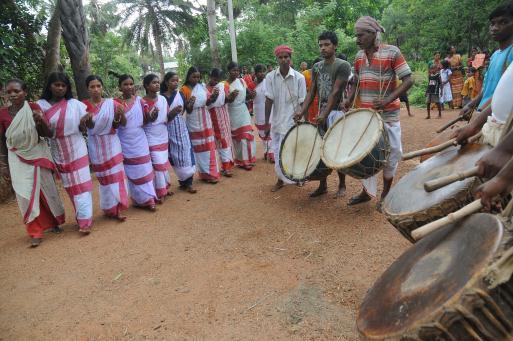
Study conducted by Anthropological Survey of India.
Research undertaken by the Anthropological Survey of India (AnSI) has pointed to a shift in the socio-economic and cultural life of tribal communities like the Santhals over the past few decades.
A recent study conducted by the AnSI at Kuotala village in West Bengal’s Birbhum district, has revealed that in six decades the economy of the village has shifted from agriculture to one of menial work. Most of the men from the village now work as daily labourers, rickshaw pullers, gardeners and caretakers at private residences. The women are engaged as maids in the various households in the region.
Interestingly, a seminal work on the Santhals of the village by Nabendu Datta Majumdar titled ‘The Santhal — A study in cultural change,’ based on the research he carried out in the 1950s, clearly states that the tribal society was primarily agrarian.
“The principal economic activities of the Santhals of Kuotala and adjoining villages are agriculture, hunting, fishing, rearing of domestic animals and day labour. Agriculture is the chief source of livelihood…” the book published in 1956 stated.
“However, now, the village economy has transformed with the rise in demand for cash in hand at the end of the day. Menial work in various developmental activities run by government or non-government organisations is being sought after by the villagers of Kuotala,” Shyamal Kumar Nandy, Research Associate, AnSI, Kolkata told The Hindu.
Along with the economic activities a change has also come about in the cultural and religious practices of the tribals. While Mr. Majumdar’s book clearly referred to a strict hierarchical order in the society, headed by a chief known as Manjhi, the latest research points to a weakening of the social structure among the Santhals.
“Some members of the community are not willing to hold the post of the Manjhi as they feel that they will have to devote a lot of time to community activities and not be able to make sufficient money,” Mr. Nandy said.
The researchers have come across an instance where the Jaherthan or the sacred grove of the Santhal community had to be shifted because of construction work carried out by the Visva Bharati, Kakuli Chakraborty, head of office, Eastern Regional Centre of (AnSI) told The Hindu.
Jaherthan — a cluster of trees — is considered by the Santhals to be the abode of their principal deities.
According to the publication of Mr. Majumdar, Kuotala dates back to 1865, long before the central university was set up, when a few immigrant Santhal families from the Santhal Parganas had settled there.
According to the book, in 1938, the land in and around Kuotala and the adjoining Santhal villages were purchased by Visva Bharati from the local zamindar of Surul and the Santhals automatically became the tenants of Visva Bharati.
source: http://www.thehindu.com / The Hindu / Home> News> National> Other States / by Shiv Sahay Singh / Kolkata – February 05th, 2015